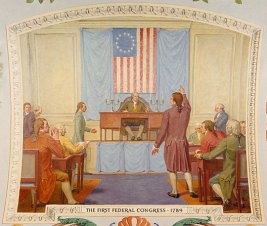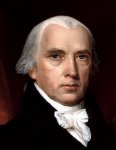 That Virginia statute, like similar ones passed in other states, was designed to give broad protections to religious freedoms, which were subsequently enshrined at the federal level in the First Amendment of the Constitution, which states:
That Virginia statute, like similar ones passed in other states, was designed to give broad protections to religious freedoms, which were subsequently enshrined at the federal level in the First Amendment of the Constitution, which states:Religious Freedom Day is celebrated in America each year on January 16 — the date of the 1786 passage of Thomas Jefferson's Virginia Statute of Religious Freedom.  That Virginia statute, like similar ones passed in other states, was designed to give broad protections to religious freedoms, which were subsequently enshrined at the federal level in the First Amendment of the Constitution, which states:
That Virginia statute, like similar ones passed in other states, was designed to give broad protections to religious freedoms, which were subsequently enshrined at the federal level in the First Amendment of the Constitution, which states:
Congress shall make no law respecting an establishment of religion or prohibiting the free exercise thereof.The Founders viewed the First Amendment and the state measures as fully securing the inalienable rights of conscience — the right to hold specific religious beliefs and then act on and behave in accordance with those beliefs. Of all religious rights, they viewed the protection of religious conscience as the most important.
 For example, Thomas Jefferson said:
For example, Thomas Jefferson said:
No provision in our Constitution ought to be dearer to man than that which protects the rights of conscience against the enterprises of the civil authority.And:
[O]ur rulers can have no authority over such natural rights, only as we have submitted to them. The rights of conscience we never submitted, we could not submit. We are answerable for them to our God.
 James Madison similarly declared:
James Madison similarly declared:Government is instituted to protect property of every sort. ... Conscience is the most sacred of all property.Sadly, in the 20th century, the rights of conscience were reduced primarily to the right of religious expression — a significant narrowing of original intent. Thus, protection was accorded to certain religious actions but no longer the motivations behind them.
The U. S. Supreme Court established what it called the "Lemon Test" which protected religious expressions as long as there was no religious motivations behind them — that is, religious expressions were permitted only if they served a secular purpose and motivation. Thus the rights of conscience became largely irrelevant.
But in the 21st century, the First Amendment was narrowed even further so that the rights of religious conscience are no longer protected. Thus, if your religious conscience says that you cannot participate in a homosexual wedding, or in the funding and promotion of abortions, or if you hold religious beliefs saying that there is a difference in genders, you can be prosecuted.
So this year on Religious Freedom Day, let's remember that the foundation of all of our religious liberties is the right of religious conscience. Let's vigorously defend this right to those around us so that they, too, can recognize and protect the full scope of our religious freedoms.